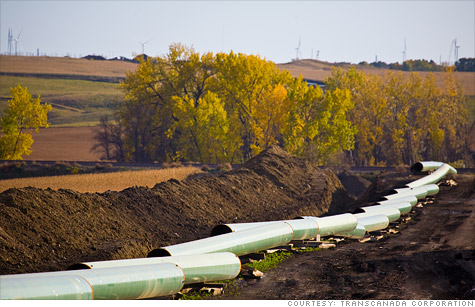
TransCanada announced Monday it will move ahead with a less controversial part of the Keystone XL pipeline to bring crude from Canada's oil sands region to the Gulf of Mexico.
NEW YORK (CNNMoney) -- TransCanada will move ahead with part of the Keystone XL pipeline that will boost the flow of crude from the oil sands of Canada to the U.S. Gulf Coast.
The company said it will build a pipeline from Cushing, Oklahoma that will move oil to refineries and terminals in Texas.
The plans announced Monday do not require federal approval. In January the Obama administration rejected a more controversial proposal from TransCanada to build a pipeline from the Montana-Canada border through Nebraska.
That proposal became a major political football. Environmentalists and some Nebraska authorities worried about the impact of the pipeline and the increase in oil sands production. Congressional Republicans argued it would be an important source of both jobs and cheap oil.
Monday's plans will help move some of the crude from Canada's oil sands, while bypassing the most controversial parts of the original proposal.
The company said it already has approval from more than 99% of the landowners in Oklahoma and Texas affected by the Cushing pipeline. It will cost $2.3 billion and is expected to be running by mid- to late-2013. TransCanada estimates it will create 4,000 jobs.
TransCanada (TRP) also said Monday it would file a new application for the controversial portion of the project. Both announcements were widely expected.
The oil sands of western Canada are a relatively new source of oil. The sands have to be heated to extract the crude, which takes a lot of energy and produces relatively dirty oil, so it didn't make economic sense to pursue this oil until prices rose to recent levels.
But the proposal to build a new pipeline from Canada's border with Montana across that state to the existing pipeline in Nebraska sparked concerns about an underground aquifer that provides drinking water for much of the state. And the fact that it would cross a national border meant that it needed approval of the White House.
When the Obama administration blocked the TransCanada project earlier this year, it said it didn't have time to do the necessary review under a deadline put in place by Republicans in Congress who backed it. The administration said at that time it didn't oppose the Cushing to the Gulf portion of the project, and on Monday it welcomed TransCanada's announcement.
But even this less controversial portion of the project will be opposed by environmental groups, such as the National Resources Defense Council. Environmentalists say they oppose any increased oil sands production, and vowed to use the local review process to try to block the project.
"I don't think it's a fait accompli," said Susan Casey-Lefkowitz, head of international program at NRDC. "We think this is a type of oil we don't need at all -- it's dirty, it's much more damaging to the environment."
Casey-Lefkowitz said the Cushing-to-Gulf pipeline could actually raise the price of gasoline for some Midwest drivers. Right now there is a glut of oil sands crude in the Midwest that's sold at a relative discount to refineries in the region. With the new pipeline that crude supply could go to the Gulf and be exported.
She argued that TransCanada's announcement, while expected, represents an end run around the national review process that should be taking place.
"This is a domestic pipeline in name only," she said. "This avoids the hard look at whether this is in the national interest." ![]()